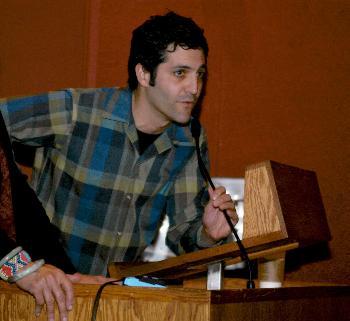On Feb. 29, director Sam Green sat in Hollywood’s Kodak Theater for the 76th Academy Awards, where his 2003 film The Weather Underground was nominated for Best Documentary Feature. This Tuesday he was in New York, where the film was included in the Whitney Museum of American Art’s biennial exhibition.
But standing before an audience at the Harvard Film Archive (HFA) on Sunday, Green seems much less interested in these measures of institutional favor than he is with the reactions he’s getting from the students who have just seen his first feature film. On Monday, he stopped by Visual and Environmental Studies (VES) 51a, “Fundamentals of Video,” to show his film and speak with a handful of film students about the Sundance-premiered film on militant radicals in the 1960s and 1970s.
“It’s great to be in theaters and it’s great to be on PBS, but the audience that I feel most strongly I’d like to see it is young people,” Green says on a cell phone call from his Boston-New York train. “I didn’t have any interest in making a piece that was going to be a walk down memory lane for baby boomers.”
This is perhaps not the most natural strategy for a film that painstakingly documents the mindset that drove formerly-peaceful activists to adopt a philosophy of violence as the Vietnam War spiraled out of control. The students who made up the Weathermen, later the Weather Underground, chose to express their objections to what they saw as an unjust, needlessly-murderous war with a series of domestic bombings throughout the 1970s on targets including the U.S. Capitol and Harvard’s Center for International Affairs.
Though their bombs never killed anyone but three of their own members in an accidental explosion, the members of the Weather Underground had inverted the very principles of pacifism that had motivated so many to oppose the Vietnam War in the first place. Green’s film is a 90-minute attempt to understand that contradiction—but ultimately, he says, the questions surrounding the Weather Underground cannot be answered for those who lived through the events.
“It’s their story in a way,” he says, but when he shows his film to boomers, he says, “the discussion afterwards digresses into who was right then.”
Instead, the 37-year-old Green says he wants to make a new generation aware of this profound moral dilemma and its renewed relevance. While some directors were doing publicity junkets with the national press or mounting aggressive Oscar campaigns, Green and co-director Bill Siegel embarked on an irregular tour of college campuses this fall. They continue to take time every few weeks to travel across the country, screening their film for students and interacting with them afterward. The day of his Harvard screening, Green conducted another showing at Brandeis University, and in the days before that he had stopped by Hampshire College and Williams College, starting dialogues with the students who saw his film.
This kind of direct contact hasn’t come without a price, according to Elisabeth Subrin, the VES visiting lecturer and filmmaker whom Green credits with helping bring him to Cambridge this weekend.
“Sam could have handed this film to a much more mainstream distributor and had no relationship with the audience,” Subrin says. “It’s kind of fun, but it’s back-breaking work when you go to college campuses. It’s certainly not a financial move.”
Green’s only complaint about his visit to Harvard, though, is that there were too many middle-aged people and not enough students in the audience at the archive. The decades-old wounds explored by The Weather Underground are still far from healing—a fact made clear by the scattered hisses that greeted figures from Richard Nixon to Todd Gitlin, a more moderate figure from the anti-war movement of the 1960s, as they appeared on screen at the HFA.
Green says the film has met with a wide variety of responses—but never a lack of emotion—at the screenings he has attended.
“Occasionally someone will stand up and say, ‘Why are you supporting terrorism?’” he says. “At the same time, there are people on the left who feel that it’s too critical. I think that if you’re getting an equal amount of flak from both sides, you’ve found a good center.”
Storm on the Horizon
Green—from the middle generation, born between the boomers he knows are still racked by the debates of the 1960s and the youth he now hopes to bring into them—says his interest in the Weather Underground long predates his career as a filmmaker.
“I remember reading something about the group when I was a teenager,” Green says. “It was very romantic in a way.”
Read more in Arts
'In the Blood' Provokes Thought













